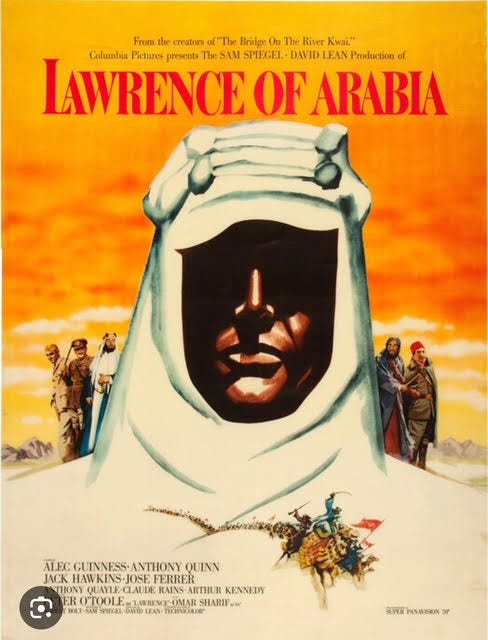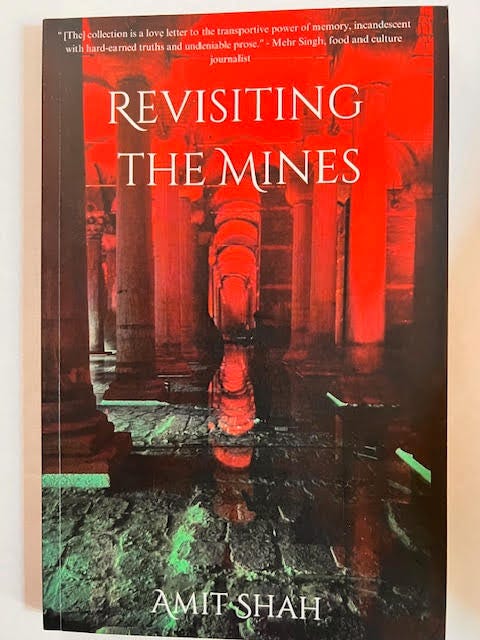Nothing Is Written
“The moral freshness of the world-to-be intoxicated us. We were wrought up in ideas inexpressible and vaporous, but to be fought for." (~ T. E. Lawrence, "Seven Pillars of Wisdom")
Jyoti Cinema in Calcutta (now Kolkata) was the first movie theater in that pulsating city to have 70mm high-definition films. It also had excellent air conditioning.
In 1962-63, I was a twelve and thirteen-year-old, seemingly a mild-mannered, well-behaved preteen who excelled at his studies and was respectful of his elders. Decades and a lifetime later, I’d add that I was also a bubbling cauldron of anxiety with a headful of desires for escape. Not toward something but out of something. And during that time, my friend Kallol and I saw David Lean’s Lawrence of Arabia. Not once but a few times.
We memorized all the lines. Everyone’s. To this day, sixty-plus years later, the lines are still resonant, long after all the actors and the filmmakers are dead.
Why? That’s what my sons wanted to know when I would make them sit through a showing and they’d inevitably fall asleep and when Pam would laugh at my singular obsession with this grandiose epic of a time long since past. I’ve seen the film at least six or seven times.
It’s an exquisite visual. The stupendously gorgeous deserts, the soft and gentle rolling dunes of Wadi Rum in present-day Jordan. And Maurice Jarre’s soaring music and Peter O’Toole’s piercing blue-blue eyes that perfectly matched the obsessive personality of Thomas Edward Lawrence. The illegitimate son of an English lord, he studied Arabic at Oxford and was fluent in Latin, French, Greek, and Turkish. He once trekked, solo, for over 1,000 miles in Syria, in 1909 as an archeology undergraduate to deepen his knowledge of Arab culture.
The film is an adaptation of historic events ---historical epic---that allows the margin to create a narrative that is even more extraordinary than the fantabulous reality.
Did Lawrence, after crossing the Nefud desert, go back to rescue Gaseem, who’d fallen off his camel and was destined to die in the midday intensity of the sun? Yes.
The crossing of the Nefud, which has no water reserves, isn’t just symbolic but strategic, as are the artillery guns, controlled by the Ottoman forces at Aqaba, the port city facing the Gulf. It was unthinkable that such an attack would come from the landward side. Lawrence and his ragtag Arab coalition swamped the Turkish forces.
Yet, long before the Balfour debacle; long before oil erupted in the Saudi Arabian desert, the British who had “ a hunger for desolate places” , a wonderful line written by Robert Bolt for a brown-faced, sad-eyed Alec Guinness as King Feisal ( this would never fly today), captured the English lust for colonies and power. And the almost naïve desire of Lawrence for a place for Arabs at the peace table after the war was thwarted by the geopolitics of imperialist powers ---Britain and France.
Lawrence, defeated and depressed, tried to live under a false name and a job as an aircraft mechanic in Britain till he was killed in a motorcycle accident, which I always thought was suicide. A bust of his is in St. Paul’s Cathedral in London.
So, back to my own obsession with this outcast.
At that early age, when I simply wanted to live a life of my own, without fear and uncertainty, I saw Lawrence achieving everything through sheer force of will. I was a scion of a family that achieved remarkable and useful things in the world through their own actions, without much help from class status. They seemed to have powered through to greatness.
And then there was Lawrence and his emotional darkness, which even at thirteen, I could decipher without knowing anything about sexual matters. The film barely touches on it except to allude that he liked and was disgusted by the sado-masochistic rape by a Turkish colonel. Historians don’t doubt Lawrence’s appetite for sadomasochism but couldn’t verify Lawrence’s account of the rape in Seven Pillars of Wisdom. I read that, aged thirteen, and my parents, who never stopped me from reading anything, probably had no clue what the contents were.
Lawrence was the epitome, for me, at age thirteen, of the learned scholar, breaking through the boundaries of class and hierarchy, to follow a dream of justice, however self-involved, that for a brief shining moment altered the trajectory of nations.
I still remember how happy I was with Kallol, in that movie theater. Before the world spun faster and faster and I disappeared into its maw.
“All men dream, but not equally. Those who dream by night in the dusty recesses of their minds, wake in the day to find that it was vanity: but the dreamers of the day are dangerous men, for they may act on their dreams with open eyes, to make them possible.” (~ T. E. Lawrence)
____________________________________________________
Friday, August 15.
I know, I know, it’s India’s Independence Day . . . but this year, it’s also the day that I’m hosting a reading of part of my new collection of essays and inviting all of you to the Q&A.







